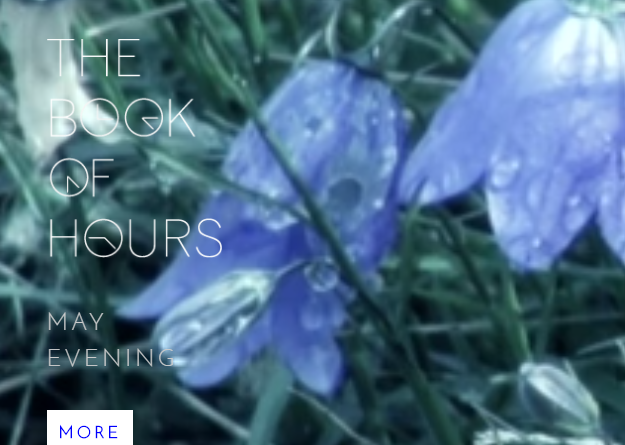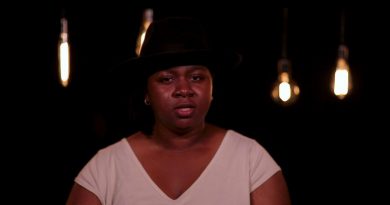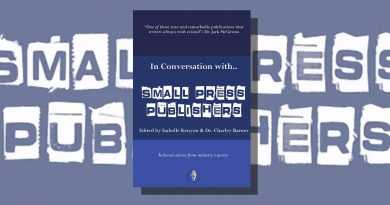THE BOOK OF HOURS. Creating a collaboration poetry film project
-By Lucy English–
When I tell people I am working on a poetry film project they make the assumption that I am creating films of myself reading or performing poetry. This is a natural response as I am a spoken word poet and, typically, my work is delivered live to an audience. My desire to create poetry films has made me re-evaluate the type of poetry I write, what word choices to use and what form it takes. As I developed The Book of Hours I have experimented with the placement of spoken poetry in a poetry film and formulated definitions of how a ‘poetry film’ differs from other filmic interpretations of poetry such as films of poets reading their work or ‘film poems’; short poetic films. The poetry I have written for this project is leaner, and more focused. There is more ‘space’ within the words for the moving images to interact and more silence. In The Book of Hours I have attempted to bring the delicate poetry film form, which is a growing but niche area of poetry, into the populist and digitally distributed arena of spoken word.
Spoken Word is often perceived to be the public delivery of noisy crowd pleasing material, which is certainly the case with poetry slams, but, for me, the lasting appeal of performing spoken word is its capacity to create an emotional connection with a live audience. It can be intimate and deeply personal. This is also the experience many people have of reading poetry but in spoken word the poet is right there, in front of the audience and the connection is immediate and cathartic. I have had twenty years experience of delivering spoken word poetry and on countless occasions audience members have approached me after the performance to say how much they were moved, how the poem made them cry, or that they have personally experienced an event mentioned in the poem. In The Book of Hours I have striven to find a suitable model which can replicate this intimate and personal experience and I have chosen to adapt the structure of a medieval Book of Hours, which were texts created for contemplative experiences.
The Book of Hours, therefore, is an attempt to create a contemporary digital version of a ‘Book of Hours’; a series of texts and images which represent the times of the day and months of the year. Inspired by the medieval Books of Hours I want to create a compendium of images and text, which evoke contemplation and thought. In our secular world we may not believe that God constantly rewards and punishes our behaviour but we still have a need for quiet thought, reflection and emotional awareness. Poetry continues to be the medium through which we can experience this, so the text in my Book of Hours will be in poetic form, rather than prose. My usual manner of delivering poetry is through spoken word, live interaction with an audience, so many of the poems in The Book of Hours will be spoken rather than written.
The Development of The Book of Hours
My role in The Book of Hours is to direct the project and the filmmakers, curate the poetry films, and to provide text, in the form of poetry, for the films. My introduction to the poetry film genre was at the MiX Digital conference at Corsham Court in 2012 which I co-organized with Sarah Tremlett, a researcher into poetry film. At the conference Sarah and I founded Liberated Words, a platform for screening poetry film in the UK. Liberated Words has since grown into a separate event. The second screening was at the Bristol Poetry Festival 2013, with work from some of the leading poetry film makers. Our third screening in 2014 was in conjunction with the Encounters Short film festival at the Watershed.
In August 2014 I visited the Dunbar Film Poetry festival organized by Alastair Cook and Marc Neys. Inspired by the festival, I created The Perseids, written in response to a sound track created by Marc. Whilst working on this film I developed the idea to create a ‘poetic sequence’ of poetry films using spoken word poetry. I was eager to understand how I could create a poetry film project with an overall theme and which people could view at their leisure. I already had a long-term fascination with illuminated manuscripts and I wanted to create poetry with the intense visual and textual experience of the medieval Books of Hours. The poetry would be secular but would try to evoke the experience of prayer or meditation.
I have to admit here that I am not a proficient user of technology. Yet through my involvement with the MIX conferences, and individuals such as Marc Amerika and Kate Pullinger, I could see that a desire to experiment can be stronger than technical knowledge, and there is a wealth of creative possibilities for writers. If I couldn’t ‘make’ a digital Book of Hours, there was somebody out there who could, and who might want to collaborate with me. Loki English, an acclaimed interaction designer, working in Berlin, offered to build the website.
I attended a poetry filmmaking workshop run by Marc for Liberated Words in 2014 so that I could understand some of the mechanics and theories of poetry film creation. Marc’s approach was simple. ‘If there is a poem in a film then it is a film poem.’ In the workshop we were encouraged to provide words for a variety of short films with the instruction to not let the images ‘illustrate the poem’. The poetry film made by the group was grainy and unedited but it taught me more how unexpected juxtapositions can provide a coherent result.
During the workshop I mention to Marc Neys that I was embarking on a PhD project and he expressed a strong interest in creating material for The Book of Hours.
Marc Neys is a Belgian based poetry film creator. He uses texts written by poets, both in English and his native language, Flemish. He has immersed himself in the poetry film experience and is regarded as one of the leading practitioners in this field. . He is passionately interested in collaboration and has a huge personal archive of ‘sound-scapes’; not music exactly but tracks of collected and curated sounds. His presence would give The Book of Hours an established and well regarded collaborator as its first filmmaker.
We started working in November 2014. My instructions to him were simple:
The tone will generally be meditative/thoughtful/disturbing. I don’t just want ‘nice’ pictures and poems.
We decided to adopt the method we had used for The Perseids; he would send me a selection of sound-scapes and I would create words for them. He would then create visual material for the combined words and sounds and the conversation would continue. When I listened to the sound-scapes I realized that he had picked up on the word ‘disturbing’ from my original instructions! Many of the tracks were cacophonic, discordant and contained what sounded like metal grating, crunching noises or pots and pans falling out of a cupboard. I felt a sense of panic.
In their co-authored article, ‘Surface Tensions: Framing the Flow of a Poetry Film collaboration’ (Mason, 2013) poet Philip Gross and film maker Wyn Mason explore the challenges and tensions of the collaborative experience. One sentence sprung to mind, ‘Opting to tread familiar paths of practice revealed an inner resistance to full collaboration.’ I decided to address my ‘inner resistance’ and start with the most ‘difficult’ tracks. I produced five poems. These were submitted to the PhD forum in Feb 2015 led by poet and critic Tim Clare.. Tim Clare’s observations were that I should be more specific in the use of my images, the title of the poem should be more arresting, and events and sequences should contain no ambiguity. I took these suggestions on board and made revisions. By March 2015 I had versions that I felt were stronger and more vivid. I recorded these and submitted them to Marc. We had earlier agreed that these poems would contain my voice speaking them rather than the text. As I am a spoken word poet I wanted the poems for The Book of Hours to reflect my strengths as a reader of my own work.
We shared the films through Vimeo and Youtube and I gleaned viewers’ responses. I also showed the films to the second year undergraduate Writing and Digital Media class. The quirky A Postcard from My Future Self was the best received. The poem suggests some unspecified future catastrophe. Marc has used retro images from found family films; a girl’s birthday party and other clips of children . These images are innocent and charming but he has spliced and re-mixed them. The sound track bangs and clashes and I remind the listener, ‘It’s gets worse. I have to tell you this.’ The poetry film is a splendid piece of black comedy and reveals Marc’s skill as a curator of images. This poetry film was selected for the Visible Verse poetry film festival in November 2015 (Verse, 2015) Visible Verse, based in Vancouver, is the leading poetry film festival for North America.
My second collaborator was Helen Dewberry. In April 2015 I attended the screening of her collaboration with poet Chaucer Cameron ‘Nothing in The Garden’. This was a poetry film sequence exploring a fractured mother/daughter relationship. I was impressed by Helen’s use of colour and her slow takes in the film.
We discussed the concept of The Book of Hours, and its intention to create some sort of reflective experience in the viewer. What sort of places does one have reflective moments in contemporary life, we asked and strangely we both came up with the same location, a motorway service station! We both felt that there was artistic possibility in the anonymous quality of a service station and its existence as a place ‘out of time’; a place where time can get lost. We decided to start with the images. Helen would send me film clips or static images and I would construct the poems out of these. She wanted more discussion and feedback than Marc as she felt she is still learning about the possibilities of the genre. We agreed to make four films.
Helen’s initial submission was a collection of static images of ordinary people in the service station car park. I was intrigued. Who were they and why were they at Gordano? I also couldn’t find a common theme to connect them. I went back to the structure of the original Books of Hours, which were collections of prayers and readings. I was brought up a Catholic and I remembered a prayer, the Litany of Saints, which calls on a long list of saints and martyrs to intercede with the faithful. In the Catholic church saints have various attributes and qualities. It seemed that I could connect this idea with the images of humanity at Gordano.
From a sudden and unprovided death, O Lord, deliver us.
From tailbacks, and junction closures, O Lord, deliver us.
From lightning and tempest, O Lord, deliver us.
From supermarket queues and lack of small change, O Lord, deliver us.
In the secular world we worry more about supermarket queues than eternal damnation.
Helen’s film juxtaposes the words of the poem with the images. This is a text-based poetry film as we felt it didn’t need a voice over. There is also a sense of wrong footing the reader here as at first the poem seems serious. It is only when we read ‘St Stephen, the saint of bricklayers’ that we wonder if we are responding correctly.
The final result is quietly comic. Helen’s skill has been placing the words next to the images. The line ‘Mary Magdalene, who knew about passion, pray for us to love wiser’ is placed next to a picture of a jaunty middle aged man in motorbike leathers. Helen showed this film at the Swindon poetry festival in September and she told me that she witnessed the audience gradually beginning to smile as they realized the poem is a parody.
The second film Do Nothing features slow sequences of a woman sitting at a window. For me, Helen’s films are strongest when she uses this method rather than the ‘cut and paste’ technique used by Marc Neys. Helen’s third film was a sequence of a car journey. I used this to write Drive Through the Night, which became a last message to my dying brother, telling him not to be afraid, even if he believed there was no afterlife. Helen’s final film uses the repeating sequence of the car at night and a fleeting image of a wolf, which could be scary or comforting, a sort of spirit guide. After this film, we decided not to make a fourth. We felt that our collaboration was now complete.
What I learned during my collaboration with Helen was how to be bolder in commenting on the visual content of the films. We discussed what worked and didn’t work, what sections needed to be expanded and what needed to be cut.
In previous creative ventures, such as Flash and Count Me In I shared news and information, via Social Media, of the early stages of the project to encourage more people to be involved. I wanted the same experience for The Book of Hours. I shared the emerging project through Twitter, Facebook groups, forums and through Movingpoems.com. The website became active in September 2015. There was a flurry of interest following this and twelve new collaborators expressed interest in collaborating.
What has emerged from using this method is that my collaborators are now coming from a wider geographic location and have more varied skills. Cheryl Gross is an animator from the U.S. Maciej Piatek uses digitally created images. Matt Mullins is an acclaimed poetry film maker from the U.S and Eduardo Yagüe primarily works in Spanish. This opens up the project to speakers of languages other than English. His film of What is Love uses a Spanish voiceover with subtitles in English.
As a poet I am passionately concerned that The Book of Hours contains poetry of a high literary standard. My spoken word poetry is narrative, often improvised, and although it contains lyrical writing the ‘story’ is predominate. The poetry for The Book of Hours conveys a mood, thought or emotion. Stories are appearing, as it seems that I cannot leave story behind, but they are more within the body of the work rather than the individual poem. I realize that I am hungry for poetic input. Tim Liardet agreed to give me a tutorial and this has been valuable input. My ‘chatty’ spoken word voice still needs to be pared down even more. He spoke also of taking the poem to a place outside of itself, what he describes as the ‘escalator moment’. He pointed out where I have achieved this and where I haven’t. We have agreed future sessions.
Films from The Book of Hours have been featured on Dave Bonta’s monthly digest of http://movingpoems.com/ Three films were shown at the Poetry on the Move Symposium at the University of Canberra in September 2015. A Postcard from my Future Self was screened at Visible Verse in Canada in Nov 2015. What is Love was screened at the Silencio Festival in Lisbon May 2016. It now feels like The Book of Hours is a vibrant and growing community of poetry film makers.
Further reading:
- Mason, P. G. a. W., 2013. Surface Tensions: Framing the Flow of a Poetry-Film Collaboration, New Writing. The International Journal for the Practice and Theory of Creative Writing, Volume 10.1080/14790726
- http://swoon-videopoetry.com
- http://www.thecinematheque.ca/visible-verse-2015-festival
- http://movingpoems.com




